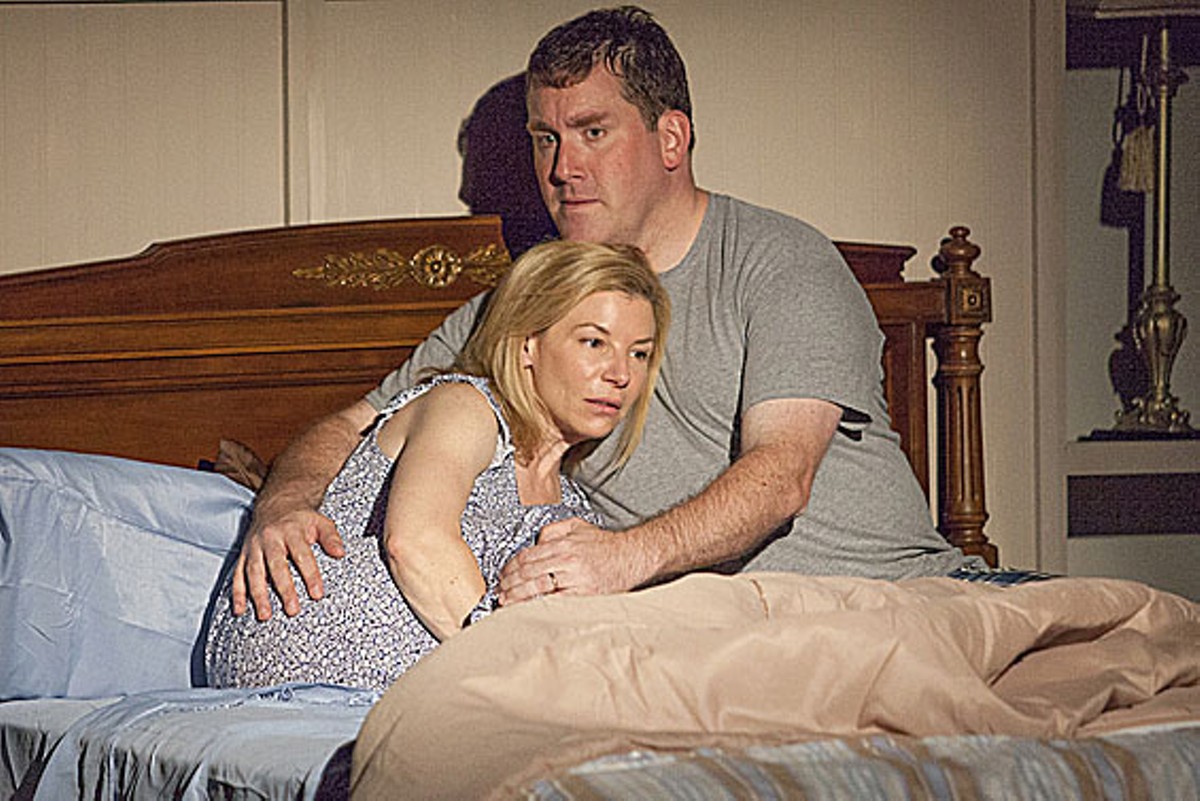You've got to meet Beth, a sprightly will-o'-the-wisp who loves dogs and sunsets and who paints vivid oil canvases. Beth is not perfect: She's helpless in the kitchen and is not precise with facts. (You might think she'd know the difference between a flight attendant and a travel agent.) But as portrayed with admirable restraint by Sarah Cannon in Donald Margulies' Dinner with Friends, which is currently being staged by Dramatic License Productions, Beth is a free spirit. Note how her feet are always propped up on a sofa or a chair; only infrequently do they touch the ground. When Beth is bedecked in a colorful turquoise skirt that might have been bequeathed to her by fan dancer Sally Rand, she resembles a wide-eyed butterfly that has just emerged from its cocoon and is ready to take flight.
So why is Beth so unhappy? For that matter, why do all four of the clearly intelligent, comfortably well-off characters in Margulies' intimate play seem so isolated? Beth's husband Tom is drowning in a loveless marriage of his own making. Their best friends Gabe and Karen inhabit a savory world where their delight in gourmet food substitutes for more deeply felt emotions — emotions that, when revealed, can turn on a dime. It's tricky for a viewer to commit to characters whose core convictions are pyloned on shifting sands.
In his quiet way, Margulies is one of our most ambitious dramatists. Although Dinner with Friends' rueful probing of the parameters of love, marriage and friendship seems straightforward enough, perhaps Margulies is striving for even more here. In his playwriting class at Yale University, he champions Thornton Wilder's Pulitzer Prize-winning Our Town as "possibly the great American play." Dinner with Friends, which won a Pulitzer in 2000, seems to bookend the action in Wilder's drama. Both plays involve the friendship between two neighboring families. The cooking of meals is of paramount importance in both plays. There are even children in an upstairs bedroom to be yelled at in both plays. But whereas Our Town, which is mostly set at the dawn of a new century in 1901, finds beauty in daily existence, Dinner with Friends speaks to the sterility of American life at the end of that century.
The current production, directed by Gary Wayne Barker, gets off to a snappy start at a dinner among friends. Michelle Hand's Karen is a charming hostess. Every strand of her tidily coiffed hair has been beaten into place with the same assertiveness with which she beat the eggs for her gourmet dessert. But Karen is less than charming when she's asked to show some tolerance for the presumed transgressions of Tom (the plaintively persuasive Chad Morris), her best friend's husband (and her husband's best friend). And when Tom begins to personify the "I've gotta be me" generation, it turns out there's less to him than meets the eye.
Alas, by evening's end the play's early momentum stalls, perhaps because Karen's husband Gabe looms ever larger in the action. As Gabe, Christopher Hickey is either miscast or misused. Certainly he is miscostumed. Clothing should help to delineate character. Some of Hickey's duds are so tacky, there's no way a stickler like Karen would allow them into her house. These clothes tell us what we don't want to hear: that Gabe, a food writer who makes his living based on his taste, is in fact tasteless.
But there's a more serious problem afoot here. By the end of Dinner with Friends, Gabe emerges as the most confused of the four characters, yet Hickey's performance is the least introspective and nuanced of the four. If Gabe doesn't take the time to think through the contradictions that are disrupting his orderly world, how can we?






